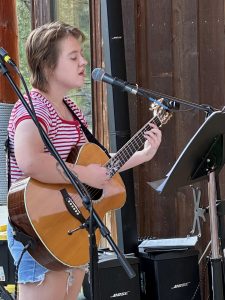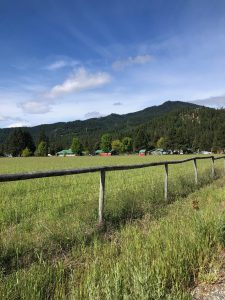
In a small town tucked away and hidden by Washington state’s Cascade Mountains, there resides a non-profit organization called Grünewald Guild. This organization offers a wide assortment of community-oriented classes based upon artistic mediums ranging from songwriting, weaving, watercolor, and many others. Due to the absolutely scenic location of the guild, there is a larger influx of students during the summer programs compared to the rest of the year, and the title of this year’s summer program is Waymaking. You may be wondering, “What does waymaking mean?” and this terminology refers to the ability that one has over their unique ways of implementing a personal touch within all of their endeavors. The Guild’s wonderful Executive Director, Sarah Sprouse, is incredibly fascinated with the manner in which rivers are able to consistently adapt and change their path depending on the season or circumstance. The tides of the tenacious rivers always persist, and they make a profound and visible impact on the environment in which they reside. A river forging its own path is a prime example of what it means to be a waymaker, but this metaphor can be easily applied to the journey that all artists pursue. Progress is almost never linear and the journey that every artist pursues demonstrates their commitment to positively impacting themselves and the world around them through their creations. Through the gentle guidance of the guest artists, the guild hopes to aid their students in their goals and objectives within their craft of choice.
Through the CAPS Fellows Program, I have the privilege of working as one of the Communication Interns at Grünewald Guild during their busy Waymaking Summer 2024 program. Through my role as a Communications Intern, I specialize in designing newsletters, writing blog posts, and creating social media guidelines to promote the guild’s core values of art, faith, and community to prospective and returning students. Accompanying this role, I also partake in programming efforts to ensure the general upkeep of the campus. I have been working at the Guild for exactly a month and my experience has been delightful and incredibly enriching; however, there was one aspect of my work experience that I did not expect to encounter.
I feel as though the way that time progresses while at the guild is quite strange to say the least. I have always had an extremely Type A personality and, since I was born and raised on the East Coast, I have always functioned under the jurisdiction of a New York minute. The mentality that was instilled in me since birth was that every task I would undertake must be done perfectly in the most timely manner possible so that I can move quickly onto my next task. I have found that this ideology has become less regional over the years and, unfortunately, has become an almost universal modus operandi. Under these conditions, the importance of art is often overlooked and swept under the rug, but the mission of Grünewald Guild actively combats this utilitarian perspective.
The Type B approach that Grünewald Guild has to their organizational climate has been a culture shock to me but it is something truly novel. I am encouraged to practice mindfulness and to literally stop and smell the flowers, more specifically the scarlet trumpets, during my time here. The more I have tried to conceptualize the Guild’s peculiar progression of time, the more my mind associates it with the highly remarkable poetry of T.S. Eliot. I am an avid fan of Eliot’s poetry and the piece of literature that began my infatuation with his work was his collection Four Quartets. In this prose, Eliot focuses on the concept of timeless moments and uses vivid imagery to symbolize that time is a series of gray areas. When I first read Four Quartets, I found it difficult to conceptualize the phenomenon of timeless moments that Eliot was illustrating but, through working at the Guild, I realized that the past, present, and future are not wrapped into neat and tidy categories that are to be easily consumed. These three categories are deeply intertwined and inherently dependent on one another, and the most fascinating nuance of this is how casually the connection manifests. I drink water from a mug that was created by Richard Caemmerer, co-founder of Grünewald Guild and former art professor at Valparaiso University, and I breathe in oxygen from trees planted by Liz Caemmerer, co-founder of Grünewald Guild. Richard and Liz Caemmerer paved the way for the success of Grünewald Guild’s pedagogy and this tutelage is rooted in their ideas from the past, intricately preserved in the small joys of the present, and will ultimately transcend into the future.

As a rising senior at Valparaiso University, one thing that has been weighing heavily on my mind recently is how I would like to indulge in my vocation post-graduation. Through my fascination with the style in which time preserves traditions and philosophies, I have begun looking into opportunities for librarianship and archival work so that I can play an active role in that conservation process. More precisely, I would like to work with music scholarship, collections, and archives in order to safeguard the unbridled power that music holds. As part of my compensation for my work at Grünewald Guild, I was able to take one of their classes completely free of charge and I chose to take the class The Muse, Your Dues, The Fuse: Songwriting with the spectacular singer-songwriter Jan Krist. During the first day of class, Krist said a phrase that has bounced in my head throughout the entire duration of that class. She said that others have described her music as “Hope in a minor key,” and that wording stuck with me due to the sheer complexity of the sentiment. The stories that people hold fall on a spectrum of emotions and, though it is cliché, it is only fitting that art should imitate life. From my scrapped lyrics written in my messy handwriting to the songs of my classmates that I constantly hum, I now carry artifacts of a timeless moment that began with the vision of Richard and Liz Caemmerer back in 1980.
— Jasmine Collins, Communications Intern at Grünewald Guild